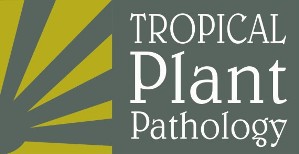The effectiveness of ten plant growth-promoting rhizobacteria (PGPR) was evaluated for the control of mini-cutting rot of eucalyptus caused by Cylindrocladium candelabrum and Rhizoctonia solani. Inhibition of the " in vitro" mycelial growth of each pathogen differed with PGPR isolate and culture medium evaluated. The most effective group of isolates was FL2 (Pseudomonas sp.), 3918, S1 and S2 (Bacillus subtilis). Under nursery conditions, isolate Ca (Pseudomonas fulva) reduced the incidence of mini-cutting rot caused by C. candelabrum by 33% compared to the control, and by 27% compared to a fungicide treatment (epoxiconazole + pyraclostrobin: 0.4 g.L-1). Inoculum density of C. candelabrum in the eucalyptus rooting medium decreased significantly beginning at 10 days after the medium was treated with the PGPR isolates. Isolate Ca was the most efficient in reducing the C. candelabrum inoculum at 15 days and in promoting rooting and growth of eucalyptus. For R. solani, no differences in disease incidence were found among treatments. Sensitivity of the PGPR isolates to ten fungicides differed widely. Tebuconazole completely inhibited 80% of the isolates, but epoxiconazole + pyraclostrobin only inhibited the S1 isolate. Isolate S1 was the most sensitive and isolates 3918 and MF2 the most resistant to the majority of active ingredients tested. Isolate Ca was selected for biological control studies in eucalyptus nursery conditions.
Eucalyptus; PGPR; Cylindrocladium; Rhizoctonia solani; biological control








